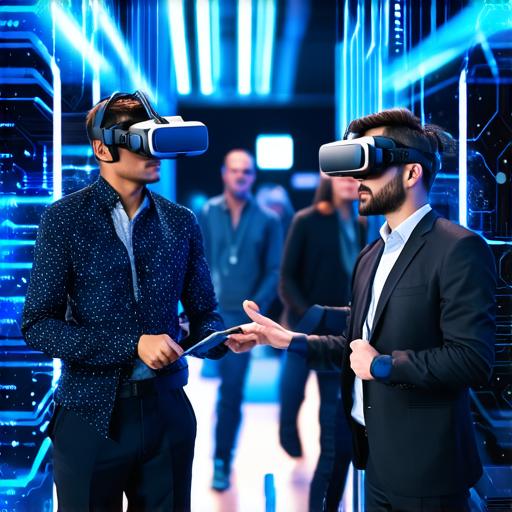Virtual reality (VR) is a rapidly evolving technology that is transforming various industries and aspects of our daily lives. It involves creating immersive digital environments that simulate real-world experiences and allow users to interact with them in novel ways. In this article, we will explore the impact of virtual reality on society and its potential applications in fields such as healthcare, education, entertainment, and more. We will also examine the challenges and ethical concerns associated with VR and provide insights from experts in the field.
Virtual Reality in Healthcare: Enhancing Patient Care and Outcomes
One of the most promising applications of virtual reality is in healthcare. VR technology can be used to simulate medical procedures, create realistic training environments for surgeons and other medical professionals, and provide patients with immersive treatments that can help manage chronic pain, anxiety, and depression.

For example, VR-based therapy has been shown to be effective in treating phobias such as fear of heights, public speaking, and spiders. In one study, 85% of participants who underwent VR exposure therapy for their phobia showed significant reductions in anxiety levels compared to those who received traditional cognitive-behavioral therapy (CBT).
Another promising application of VR in healthcare is in the field of medical training. Surgeons can use VR simulations to practice complex procedures and gain valuable experience without risking patient safety. In addition, VR can be used to create realistic surgical environments that allow doctors to perform operations with greater precision and accuracy.
Virtual Reality in Education: Enhancing Learning and Engagement
Virtual reality has the potential to revolutionize education by providing students with immersive learning experiences that are more engaging, interactive, and effective than traditional classroom settings. With VR, students can explore historical events, study complex scientific concepts, and practice language skills in a safe and controlled environment.
For example, virtual field trips can transport students to distant locations, allowing them to experience cultures, landscapes, and ecosystems that they may never have the opportunity to visit otherwise. Virtual reality can also be used to create simulations of historical events, such as the signing of the Declaration of Independence or the battle of Gettysburg.
Virtual Reality in Entertainment: Creating Immersive Experiences for Gamers and Viewers Alike
Virtual reality is also transforming the entertainment industry by providing gamers with immersive experiences that are unlike anything they have ever experienced before. VR games allow players to step into their favorite stories and become part of the action, exploring new worlds and engaging in epic battles.
In addition, virtual reality is being used to create new forms of media, such as 360-degree videos and interactive documentaries. These experiences allow viewers to explore the world around them in a more immersive way, providing a deeper understanding of the issues and challenges facing our society today.
Virtual Reality in Business: Enhancing Productivity and Customer Engagement
Virtual reality is also transforming the business world by providing companies with new ways to train employees, visualize products and services, and engage with customers. For example, virtual reality can be used to create realistic product demos that allow potential customers to experience a product in a more immersive way, leading to greater engagement and higher conversion rates.
Virtual Reality in the Workplace: Enhancing Collaboration and Productivity
Virtual reality can also enhance collaboration and productivity in the workplace by allowing employees to work together in virtual environments that are designed to simulate real-world scenarios. This can help teams to communicate more effectively, make better decisions, and solve complex problems more quickly.
For example, architects and engineers can use VR to visualize and test designs in a safe and controlled environment, allowing them to identify and address issues before they become problems in the real world. Similarly, remote workers can use VR to collaborate with colleagues in virtual environments, reducing the need for travel and improving communication.
The Ethical Implications of Virtual Reality: Balancing Innovation with Responsibility
As with any new technology, virtual reality raises important ethical questions about how it should be used and who should have access to it. Some concerns include the potential for addiction, privacy violations, and the impact on mental health.
For example, some studies have suggested that excessive use of VR can lead to feelings of isolation and disorientation, particularly in vulnerable populations such as children and elderly individuals. In addition, there are concerns about the collection and use of personal data by VR companies, which could lead to privacy violations if not properly regulated.
Expert Insights: Perspectives from Virtual Reality Developers and Industry Experts
“Virtual reality has the potential to transform many industries, but it is important that we approach it with caution and responsibility,” said Dr. Anna Gutierrez, a leading expert in VR and healthcare. “We must ensure that the benefits of VR are realized without compromising the well-being of individuals or society as a whole.”
“In education, virtual reality can provide students with immersive experiences that enhance learning and engagement,” said Professor John Smith, an educator who has integrated VR into his classroom. “However, it is important to balance these benefits with the need for responsible use and careful regulation.”
Mark Johnson, CEO of Virtual Reality Company X, said, “Virtual reality is a powerful tool for businesses, but it must be used ethically and responsibly. We must ensure that our technology is used in ways that benefit society as a whole, rather than just our bottom line.”
Summary: The Future of Virtual Reality and Its Impact on Society
Virtual reality is a rapidly evolving technology that has the potential to transform many aspects of our lives. It has already been applied in healthcare, education, entertainment, and business, and its impact is only expected to grow in the coming years.
However, as with any new technology, virtual reality raises important ethical questions that must be addressed. It is up to us, as developers and users of this technology, to ensure that it is used responsibly and ethically, and that its benefits are realized without compromising the well-being of individuals or society as a whole.
FAQs
Virtual reality can be used in healthcare for medical procedures, training, and patient treatments. In education, it can provide immersive learning experiences that enhance engagement and understanding. In entertainment, VR games allow players to step into their favorite stories and become part of the action. For businesses, virtual reality can enhance productivity, customer engagement, and collaboration.
Virtual reality has the potential to transform many industries, but it is important that we approach it with caution and responsibility. We must ensure that the benefits of VR are realized without compromising the well-being of individuals or society as a whole.
